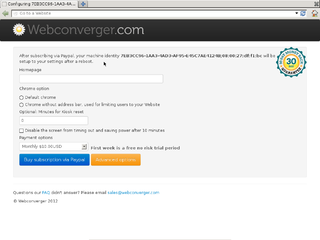
A Linux distribution is an operating system made from a software collection that includes the Linux kernel and often a package management system. Linux users usually obtain their operating system by downloading one of the Linux distributions, which are available for a wide variety of systems ranging from embedded devices and personal computers to powerful supercomputers.

Solaris is a proprietary Unix operating system originally developed by Sun Microsystems. After the Sun acquisition by Oracle in 2010, it was renamed Oracle Solaris.
deb is the format, as well as filename extension of the software package format for the Debian Linux distribution and its derivatives.
The Cobalt RaQ is a 1U rackmount server product line developed by Cobalt Networks, Inc. featuring a modified Red Hat Linux operating system and a proprietary GUI for server management. The original RaQ systems were equipped with MIPS RM5230 or RM5231 CPUs but later models used AMD K6-2 chips and then eventually Intel Pentium III CPUs for the final models.
TrueNAS is the branding for a family of network-attached storage (NAS) products produced by iXsystems. They include both free and open-source and commercial offerings, based on the OpenZFS file system and either FreeBSD or Linux. It is licensed under the terms of the BSD License and runs on both commodity x86-64 hardware and turnkey appliances offered by iXsystems.

Kernel-based Virtual Machine (KVM) is a free and open-source virtualization module in the Linux kernel that allows the kernel to function as a hypervisor. It was merged into the mainline Linux kernel in version 2.6.20, which was released on February 5, 2007. KVM requires a processor with hardware virtualization extensions, such as Intel VT or AMD-V. KVM has also been ported to other operating systems such as FreeBSD and illumos in the form of loadable kernel modules.

A computer appliance is a computer system with a combination of hardware, software, or firmware that is specifically designed to provide a particular computing resource. Such devices became known as appliances because of the similarity in role or management to a home appliance, which are generally closed and sealed, and are not serviceable by the user or owner. The hardware and software are delivered as an integrated product and may even be pre-configured before delivery to a customer, to provide a turn-key solution for a particular application. Unlike general purpose computers, appliances are generally not designed to allow the customers to change the software and the underlying operating system, or to flexibly reconfigure the hardware.
The Ångström distribution is a defunct Linux distribution for a variety of embedded devices. The distribution is the result of work by developers from the OpenZaurus, OpenEmbedded, and OpenSIMpad projects. The graphical user interfaces (GUIs) available are OPIE and GPE among other options.

Webconverger is a discontinued Linux-based operating system designed solely for accessing Web applications privately and securely. Based on the Debian distro, it is able to boot live from removable media like CD-ROM or USB flash drive but can also be installed to a local hard drive. Webconverger is pre-compiled to run on any x86 hardware. It does not have high system requirements and will also run on older machines.

Openmoko Linux is an operating system for smartphones developed by the Openmoko project. It is based on the Ångström distribution, comprising various pieces of free software.
The opkg software is a lightweight package management system based upon ipkg. It is written in C and resembles Advanced Package Tool (APT)/dpkg in operation. It is intended for use on embedded Linux devices and is used in this capacity in the OpenEmbedded and OpenWrt projects.

Illumos is a partly free and open-source Unix operating system. It is based on OpenSolaris, which was based on System V Release 4 (SVR4) and the Berkeley Software Distribution (BSD). Illumos comprises a kernel, device drivers, system libraries, and utility software for system administration. This core is now the base for many different open-sourced Illumos distributions, in a similar way in which the Linux kernel is used in different Linux distributions.

SmartOS is a free and open-source SVR4 hypervisor based on the UNIX operating system that combines OpenSolaris technology with bhyve and KVM virtualization. Its core kernel contributes to the illumos project. It features several technologies: Crossbow, DTrace, bhyve, KVM, ZFS, and Zones. Unlike other illumos distributions, SmartOS employs NetBSD pkgsrc package management. SmartOS is designed to be particularly suitable for building clouds and generating appliances. It was originally developed for and by Joyent, who announced in April 2022 that they had sold their business supporting and developing of Triton Datacenter and SmartOS to MNX Solutions. It is open-source and free for anyone to use.

OpenZFS is an open-source implementation of the ZFS file system and volume manager initially developed by Sun Microsystems for the Solaris operating system and now maintained by the OpenZFS Project. It supports features like data compression, data deduplication, copy-on-write clones, snapshots, and RAID-Z. It also supports the creation of virtual devices, which allows for the creation of file systems that span multiple disks.
Container Linux is a discontinued open-source lightweight operating system based on the Linux kernel and designed for providing infrastructure for clustered deployments while focusing on automation, ease of application deployment, security, reliability, and scalability. As an operating system, Container Linux provided only the minimal functionality required for deploying applications inside software containers, together with built-in mechanisms for service discovery and configuration sharing.

Familiar Linux is a discontinued Linux distribution for iPAQ devices and other personal digital assistants (PDAs), intended as a replacement for Windows CE. It can use OPIE or GPE Palmtop Environment as the graphical user interface.









